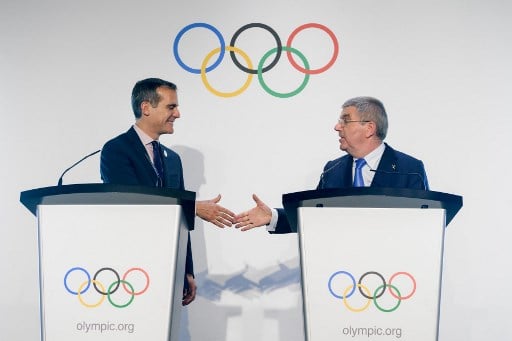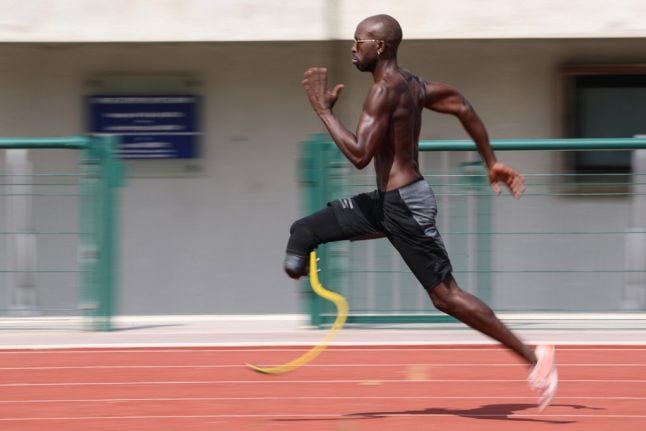OLYMPICS
IOC strategy pays off as Los Angeles agrees to take on 2028 Olympics
There is a maxim in politics that says you should never let a crisis go to waste: International Olympic Committee (IOC) president Thomas Bach seems to have taken that to heart.
Published: 2 August 2017 08:26 CEST

Eric Garcetti and Thomas Bach shake hands. Photo: Fabrice Coffrini/AFP
By cleverly engineering a pact for Paris to host the 2024 Games with Los Angeles waiting until 2028, the Lausanne-based IOC boss has steered the Olympic movement from a moment of worrying uncertainty towards stability, analysts have said.
When Hamburg, Rome, Budapest and Boston all dropped out of the 2024 race, primarily citing public concern over costs, the IOC confronted a problem that had been brewing for years.
Cities — and voters — were increasingly dismissing the Games as too expensive to bid for, and far too expensive to host, leaving the IOC with a short roster of candidates ready for the challenge.
Then Los Angeles jumped in, replacing Boston.
The French capital and California metropolis both put forward bids that fulfilled the IOC's top priorities: cost-cutting, environmental protection and assuring long-term benefits for the host community.
Bach, as he has said repeatedly, sensed “a golden opportunity”.
Rather than turn one city away, he could offer the Games to both Paris and Los Angeles, safeguarding the Olympic movement for the coming decade.
The revelation from Los Angeles on Monday that it had agreed to host 2028 was the final piece of that plan, which also required Bach convincing IOC members that the double hosting deal was a good idea.
Right strategy, right time?
“Bach was able to turn a crisis into an opportunity, stabilising the summer Games until the end of his presidency and giving him time to focus on reform,” said Jean-Loup Chappelet, a professor at the Graduate School of Public Administration at the University of Lausanne.
Bach's Agenda 2020, a roadmap for the IOC's future that focuses on reducing bidding costs and overhauling hosting, is at the forefront of his current term, which expires in 2021.
With the summer Games — the IOC's main cash cow — in secure hands, Bach can focus on pushing his reforms before deciding whether to seek a final four-year term.
Chappelet, a specialist in the Olympic movement, also noted that Bach's double hosting plan was helped by the fact that it lined up with the “personal strategies” of Paris Mayor Anne Hidalgo and her Los Angeles counterpart Eric Garcetti.
Hidalgo, elected in 2014, is set to earn high praise for finally bringing the Games back to Paris, 100 years after the city last hosted them.
Garcetti, as Chappelet pointed out, is widely considered to be weighing a run for the Democratic Party's presidential nomination in 2020 and being the public face of an Olympic bid has helped his exposure.
A key factor in rallying support for the double hosting deal was the need to avoid alienating Los Angeles and the United States, experts said.
The US was “the saviour of the Olympic movement” when it risked financial troubles in the 1980s, Patrick Nally, a sports marketing specialist who was one of the creators of the IOC's The Olympic Partner (TOP) sponsorship programme, told AFP earlier this year.
Los Angeles held a landmark Games in 1984, the NBC network stepped in with a major television deal and Coca Cola was a huge sponsor.
Nally and others have noted that while Paris is an iconic city, the US outpaces France when it comes to the IOC's long-term financial future.
Bach “cannot afford to risk upsetting and destroying the one market IOC is totally dependent on”, Nally said.
Url copied to clipboard!




 Please whitelist us to continue reading.
Please whitelist us to continue reading.